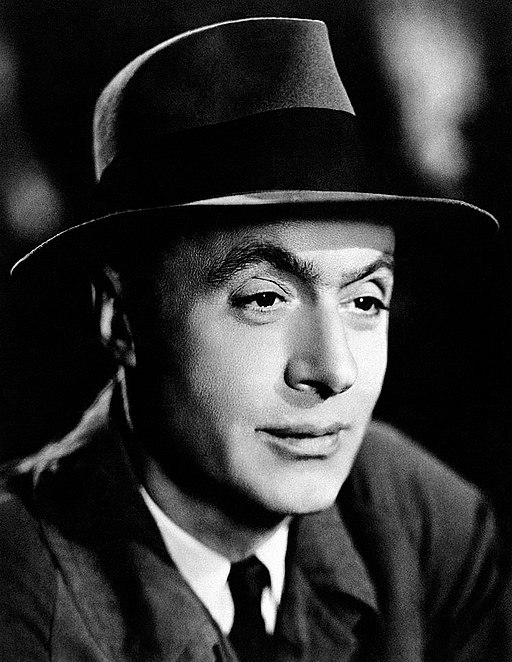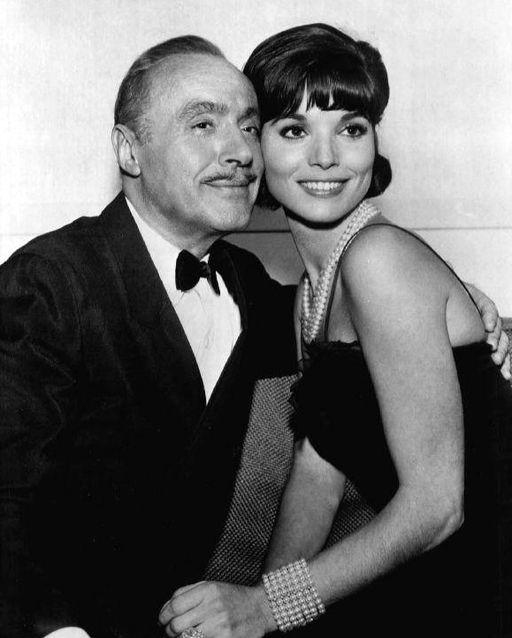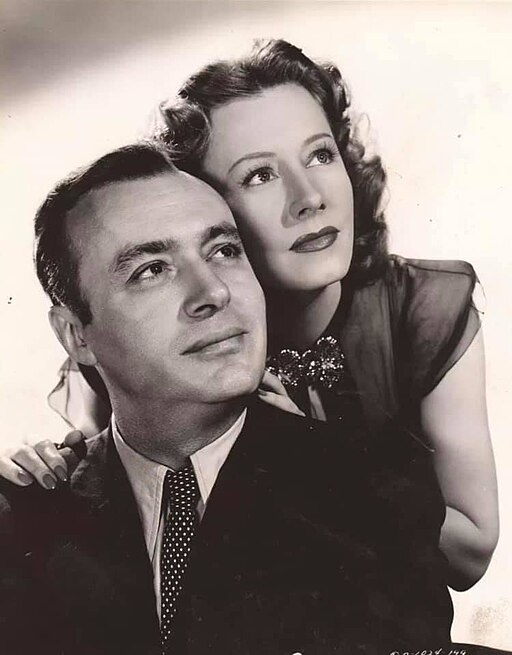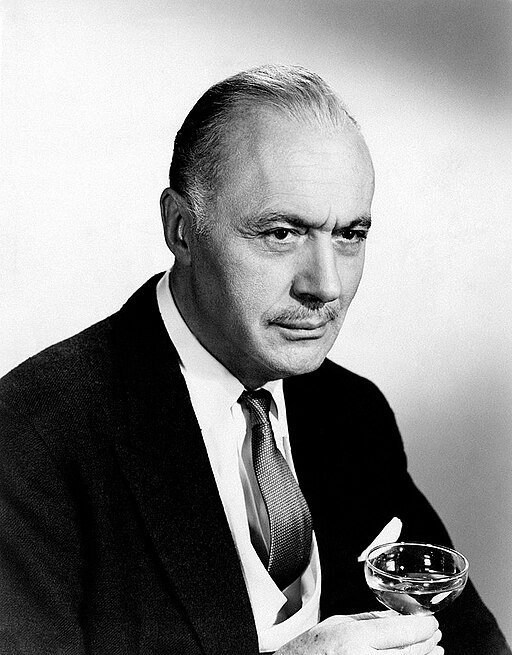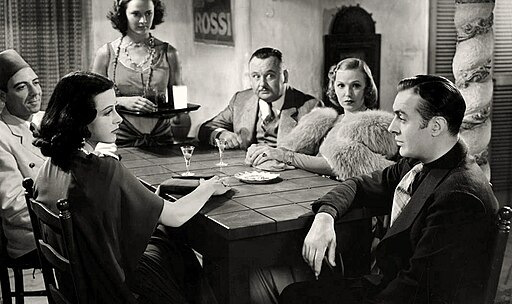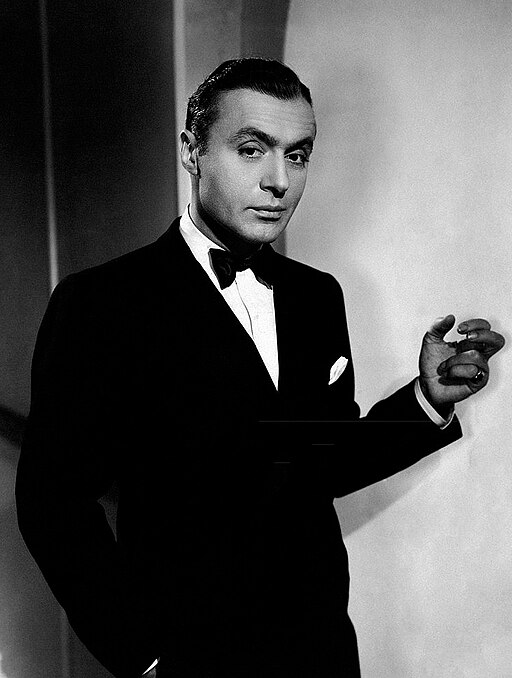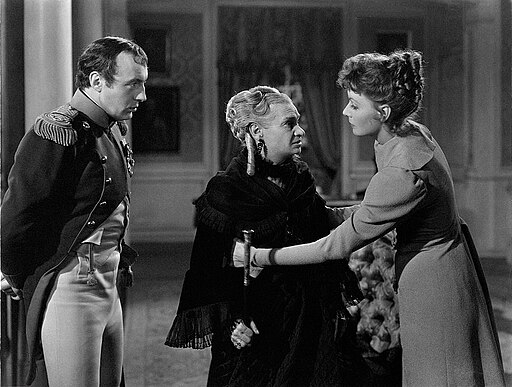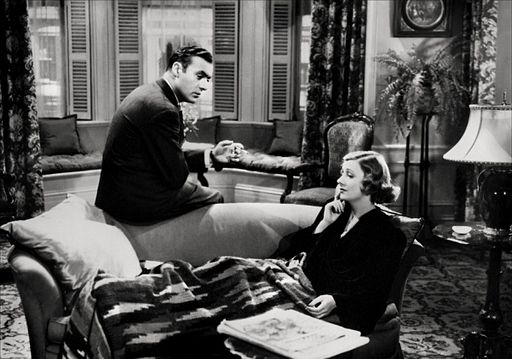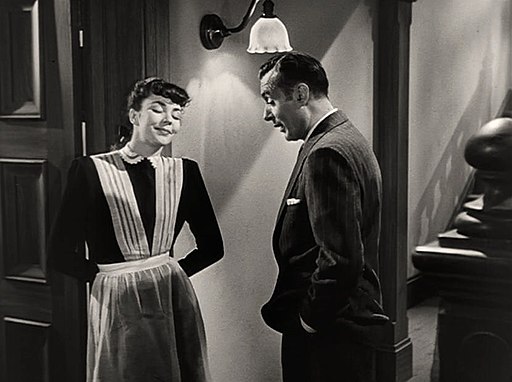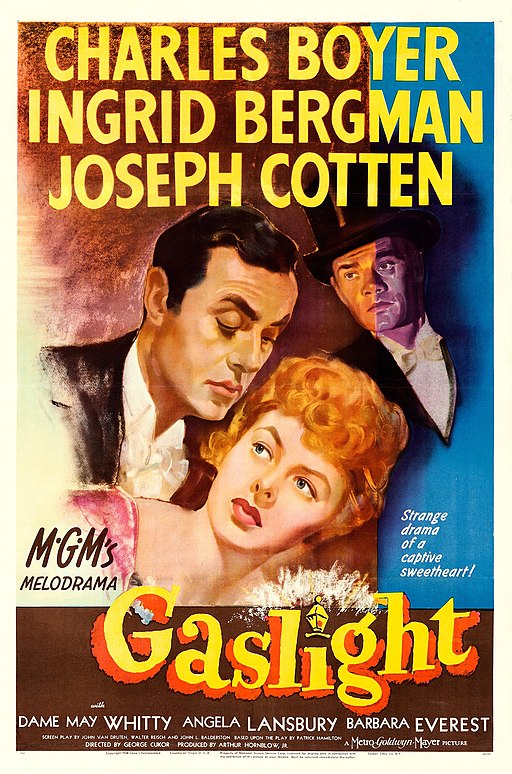Charles Boyer
back| Full Name | Charles Boyer |
| Stage Name | Charles Boyer |
| Born | August 28, 1899 |
| Birthplace | Figeac, Lot, France |
| Died | August 26, 1978 |
| Buried | He was cremated, and his ashes are interred at the French Cemetery, Los Angeles, California, alongside his wife and son. |
| Married to | Charles Boyer was married to British actress Pat Paterson. They married in 1934, and their union lasted until Paterson's death in 1978. |
| Children | Michael Charles Boyer (1943-1965) |
| Notable films | Gaslight (1944) - Love Affair (1939) - Algiers (1938) - Conquest (1937) - Fanny (1961) |
Charles Boyer
The Great Lover of the Silver Screen
Charles Boyer's career spanned over six decades, during which he appeared in more than 80 films. He was known for his ability to play both romantic and complex characters, often embodying the archetype of the sophisticated gentleman.
Despite facing personal tragedy, Boyer remained a beloved figure in both Hollywood and European cinema until his death, which occurred just two days before his 79th birthday. His legacy lives on through his films and the indelible mark he left on the world of cinema.
Related
Charles Boyer (1899 – 1978)
Biography and Career Overview
Charles Boyer, celebrated for his compelling performances and magnetic screen presence, led a life that paralleled the intensity and depth of the characters he portrayed. Born on August 28, 1899, in Figeac, Lot, France, Boyer's journey from a small French town to the pinnacle of Hollywood stardom is a testament to his enduring talent and charisma.
Early Years and Path to Success
From a young age, Boyer was captivated by the arts, showing an early inclination towards theatre and performance. His passion led him to Paris, where he studied at the Conservatoire de Paris, honing his craft among the future luminaries of French cinema and theatre. It wasn't long before Boyer's talents were recognized, leading to his debut on the French stage and quickly transitioning into silent films.
As the film industry evolved, so did Boyer's career. With the advent of sound in cinema, his deep, resonant voice became one of his most distinctive features, setting him apart from his peers and endearing him to audiences worldwide. Boyer's transition to Hollywood in the 1930s marked the beginning of an illustrious career in American cinema. His ability to embody complex characters with sophistication and depth made him a favorite among directors and audiences alike.
Marriages and Personal Life
In 1934, Boyer's personal life took a romantic turn when he married British actress Pat Paterson. Their marriage was a testament to their profound connection and mutual respect, enduring the many challenges that come with life in the spotlight. The couple's union was blessed with a son, Michael Charles Boyer, born in 1943, bringing a new dimension of joy to their lives.
Passions and Humanitarian Efforts
Beyond the silver screen, Boyer was known for his intellect and passion for the arts. He was an avid reader, fluent in multiple languages, and had an appreciation for literature and classical music. His cultural sophistication and worldly perspective made him as intriguing off-screen as he was on it.
Boyer's influence extended beyond his artistic endeavors; he was actively involved in charitable and humanitarian efforts, particularly during World War II, when he supported the French Resistance and contributed to the war relief efforts. His commitment to helping others spoke volumes about his character and the values he held dear.
Death and Legacy
Tragically, the later years of Boyer's life were marked by personal loss. In 1965, his only son, Michael, died by suicide at the age of 21, a devastating blow that deeply affected Boyer and his wife. Pat Paterson, Boyer's wife of over four decades, passed away in 1978 from cancer, leaving him heartbroken.
Overwhelmed by grief, Charles Boyer's life came to a poignant end on August 26, 1978, just two days before his 79th birthday. He died by suicide, leaving behind a legacy of cinematic excellence and a profound sense of loss within the film community and among his fans worldwide. Boyer's death was a somber close to a life filled with remarkable achievements, personal trials, and an enduring contribution to the arts.
Boyer's indelible mark on the film industry, characterized by his unforgettable performances, suave demeanor, and distinctive voice, cements his place in the pantheon of cinematic legends. His life, while marked by its share of tragedy, showcases the complexity and resilience of a man who captivated hearts across the globe, both on and off the screen.
The Magnetic Impact of Charles Boyer:
Notable Movies featuring Charles Boyer:
1930s: The Rise of a Star
- "L'Homme du Jour" (1937): Boyer plays a shy electrician who becomes an overnight sensation when he knocks out a boxing champion in a musical comedy that showcases his versatility and charm.
1940s: Hollywood's Romantic Lead
- "Gaslight" (1944): In this psychological thriller, Boyer portrays Gregory Anton, who manipulates his wife (Ingrid Bergman) into believing she is going insane, in an effort to conceal his dark past. A masterful performance that earned him critical acclaim.
- "Love Affair" (1939): Boyer's character, a playboy painter, meets and falls in love with an engaged woman (Irene Dunne) on a cruise. Their promise to reunite atop the Empire State Building tests their love in this romantic classic.
1950s: The Established Actor
- "Hold Back the Dawn" (1941): Boyer plays a Romanian gigolo in Mexico, who marries an American teacher (Olivia de Havilland) to gain entry to the US, only to genuinely fall in love with her, in this drama about love and redemption.
1960s: A Mix of Genres
- "Fanny" (1961): As Cesar, Boyer delivers a poignant performance in this drama about a complicated love story set in Marseille, showing his depth and emotional range.
1970s: The Final Roles
- "Stavisky" (1974): In one of his last films, Boyer plays Baron Raoul, adding gravitas to this political drama about the infamous financier Serge Alexandre Stavisky.
Analysis of Charles Boyer’s Style of Acting:
Charles Boyer's acting style is emblematic of a bygone era in cinema, where subtlety, charm, and a deep emotional resonance were paramount. Known for his distinctive, smooth voice and impeccable diction, Boyer brought an air of sophistication and elegance to every role he inhabited. His acting style can be dissected into several key elements that made him a standout actor of his time and a lasting icon in film history.
Emotional Depth and Nuance
Boyer excelled at portraying complex emotional states, often conveying a character's inner turmoil or passion with a mere glance or subtle gesture. He had a remarkable ability to project vulnerability and strength simultaneously, making his characters relatable and multifaceted. In romantic dramas, such as "Love Affair" and "The Earrings of Madame de…," his performances were marked by a profound depth of feeling, demonstrating his skill at conveying the nuances of love, loss, and longing.
Charismatic Presence and Sophistication
Boyer's on-screen presence was undeniably magnetic. He possessed a natural elegance and charm that made him equally convincing as a romantic lead and as a more sinister character, as seen in "Gaslight." His French accent and suave demeanor added to his allure, setting him apart from other leading men of his era and contributing to his status as a symbol of romance and sophistication in Hollywood.
Versatility
Despite being strongly associated with roles of the debonair gentleman, Boyer's range as an actor was impressive. He navigated between genres with ease, from comedies to dramas to thrillers, showcasing his versatility. In "Fanny," he displayed a tender, paternal side, while in "Algiers," he embodied the cunning and charm of a thief. His portrayal of Napoleon in "Conquest" illustrated his capacity to delve into historical figures, bringing a complex blend of ambition, power, and vulnerability to the role.
The Art of Subtlety
One of the hallmarks of Boyer's acting was his mastery of subtlety. He understood the power of understatement, often employing a minimalist approach to convey a character's emotions or intentions. This restraint made his performances more compelling and authentic, allowing the audience to fill in the emotional spaces with their interpretations. In an era where over-the-top performances were not uncommon, Boyer's nuanced approach set him apart.
Legacy
Charles Boyer's acting style has had a lasting impact on cinema, influencing subsequent generations of actors. His ability to blend charm with complexity, along with his mastery of emotional depth and subtlety, remains a benchmark for cinematic performance. Boyer's legacy is that of an actor who could transcend the barriers of language and culture, captivating audiences worldwide with his timeless elegance and profound humanity.
Memorable Quotes from Charles Boyer:
Charles Boyer, with his distinguished career and suave persona, left behind a number of memorable quotes both on and off the screen. While his characters in films delivered lines that have lingered in cinematic history, Boyer himself also shared insights that reflected his views on acting, love, and life. Here are some memorable quotes attributed to Charles Boyer:
From His Films
- In "Love Affair" (1939), his character Michel Marnet says, "We were talking about the magic of your paints. You said they were great enough to make life go on forever. That's true only about love, real love. No one can paint it, but it's there, as long as life goes on."
- In "Gaslight" (1944), as Gregory Anton, Boyer chillingly manipulates his wife, played by Ingrid Bergman, with lines that underscore his character's menacing control, "You know, Paula, you have an imagination. That's what Charles Dickens said."
Personal Quotes
- Reflecting on the transient nature of film acting, Boyer remarked, "An actor is only merchandise."
- On the essence of his enduring appeal and the nature of his screen persona, Boyer once said, "I am essentially a mediocre man. Neither good, nor bad, just mediocre. But I do possess a certain consistency and integrity which has helped me adapt myself to any role."
- Boyer shared his philosophical view on love, stating, "A man in love is incomplete until he has married. Then he's finished."
- Discussing the craft of acting, Boyer offered, "Acting is a way of living out one's insanity."
Significance of his Performance in “Conquest”:
Charles Boyer's performance in "Conquest" (1937) is a pivotal moment in his career for several reasons, marking not only a high point in his trajectory as an actor but also solidifying his status as a leading man in Hollywood. This film, which tells the story of the romantic relationship between Napoleon Bonaparte and Countess Marie Walewska, allowed Boyer to showcase his range as an actor, demonstrating his ability to inhabit deeply complex characters and convey nuanced emotions.
Career Significance
Showcased His Dramatic Range
"Conquest" offered Boyer a chance to depart from the romantic lead roles that had initially made him a star. By portraying Napoleon Bonaparte, Boyer was able to display his versatility and depth as an actor, embodying the charisma, ambition, and vulnerability of one of history's most iconic figures. This performance demonstrated his capacity for more serious, dramatic roles, expanding his acting repertoire.
Established Him as a Hollywood Star
By the time "Conquest" was released, Boyer had already made a name for himself in Hollywood, but this film further cemented his status as a leading man. His portrayal of Napoleon showcased not just his talent, but also his ability to carry a major Hollywood production, making him highly sought after by studios and directors.
Critical Acclaim
Boyer's performance in "Conquest" was well-received by critics, earning him widespread acclaim and further accolades. While he did not win, the role contributed to his receiving an Academy Award nomination for Best Actor. Such recognition affirmed his place among the top tier of Hollywood actors of the era and showcased his appeal to both American and international audiences.
Artistic Collaboration
"Conquest" also highlighted Boyer's capacity for collaborating with other major talents, including co-star Greta Garbo, who played Countess Marie Walewska. Their on-screen chemistry was lauded and became a significant aspect of the film's success. This ability to work effectively with other leading actors and actresses became a hallmark of Boyer's career.
Contribution to His Legacy
The film is a key part of Boyer's legacy, representing the breadth of his talent and the diverse range of characters he was able to portray. It stands as a testament to his skill in bringing historical figures to life with empathy and depth, contributing to the enduring appeal of his body of work.
Awards and Recognition:
Academy Awards (Oscars)
- Boyer was nominated for the Best Actor Oscar four times:
- 1938: For his role in "Conquest"
- 1944: For his role in "Gaslight"
- 1948: For his role in "Love Affair"
- 1961: For his role in "Fanny"
- In 1942, he was awarded an Honorary Oscar in recognition of his "progressive cultural achievement" in establishing the French Research Foundation in Los Angeles.
Golden Globe Awards
- Boyer won a Golden Globe for Best TV Star - Male for his work in the television anthology series "Four Star Playhouse."
- He was also nominated for Best Actor in a Motion Picture Drama for "Fanny" in 1962.
Emmy Awards
- Boyer received an Emmy nomination for his performance in a television project, highlighting his versatility and skill in transitioning between film and television roles.
Cannes Film Festival
- At the Cannes Film Festival, Boyer was awarded the Best Actor prize for his role in "The Earrings of Madame de…" in 1953, underlining his international acclaim.
Other Honors
- Boyer was also recognized with the French Legion of Honor, France's highest order of merit for military and civil merits, showcasing the esteem in which he was held in his home country.
- He received a star on the Hollywood Walk of Fame, located at 6300 Hollywood Blvd, further cementing his legacy in the annals of Hollywood history.
Important Movies with Charles Boyer:
1920s
- L'Homme du Large (1920)
- Esclave (1922)
1930s
- The Magnificent Lie (1931)
- Red-Headed Woman (1932)
- L'Épervier (1933)
- Caravan (1934)
- Break of Hearts (1935)
- Mayerling (1936)
- Tovarich (1937)
- Conquest (1937)
- Algiers (1938)
- Love Affair (1939)
1940s
- All This, and Heaven Too (1940)
- Back Street (1941)
- Gaslight (1944)
- Love Letters (1945)
- Cluny Brown (1946)
- Arch of Triumph (1948)
- The 13th Letter (1951)
1950s
- The First Legion (1951)
- The Happy Time (1952)
- The Earrings of Madame de… (1953)
- Gaslight (1956, TV Movie)
- Paris, Palace Hotel (1956)
- Around the World in 80 Days (1956)
- Maxime (1958)
1960s
- Fanny (1961)
- Love Is a Ball (1963)
- Paris When It Sizzles (1964)
- How to Steal a Million (1966)
- Casino Royale (1967, uncredited)
- Barefoot in the Park (1967)
1970s
- Lost Horizon (1973)
- Stavisky (1974)
- A Matter of Time (1976)

